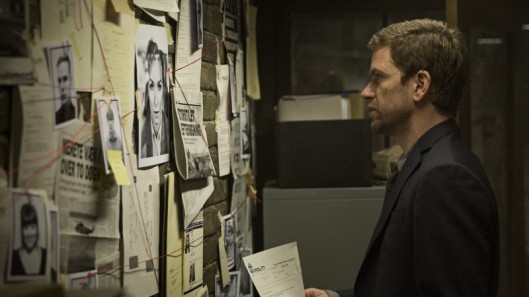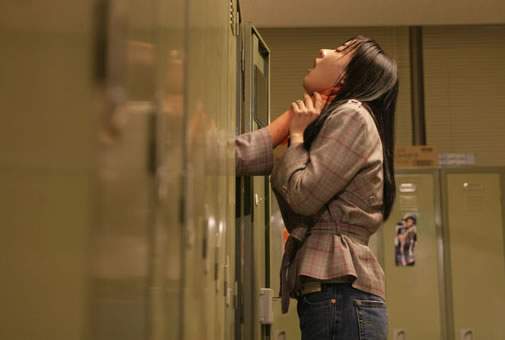Tags
Affair, Aldo Monti, Alma Delia Fuentes, Ana Martín, Anaesthetic, Anthology, Drama, Horror, Joaquín Cordero, José Gálvez, Julián Soler, Mexico, Review, Yellow fever
Original title: Pánico
D: Julián Soler / 85m
Cast: Ana Martín, Ofelia Guilmáin, Joaquín Cordero, José Gálvez, Susana Salvat, Alma Delia Fuentes, Aldo Monti, Carlos Ancira, Pilar Sen
In Panic, a young woman (Martín) flees from another woman (Guilmáin) who is dressed in pink and carrying a knife. At first, the young woman manages to avoid her by escaping into the woods, but the woman in pink pursues her. At one point the young woman thinks she’s evaded her but the woman in pink reappears. In between periods of running through the woods, the young woman has flashbacks to an earlier time when she was brutally attacked by five men. With three men trying to block her escape, the young woman is eventually caught up with by the woman in pink, and a struggle to the death ensues.
In Soledad, two men, Carlos (Cordero) and Abel (Gálvez) are in a village that has fallen victim to an outbreak of yellow fever. Having buried the last victim – who proves to be Abel’s wife (Salvat) – they get in their boat and head down river and away from the plague zone. When their boat capsizes and they find themselves stranded in the swamp, Carlos is unable to deal with the idea that they’ll most likely perish there. He begins to go mad, and in the process, reveals that he was having an affair with Abel’s wife. Distraught at what he’s done, and for betraying his friend’s trust, Carlos implores Abel to kill him. They fight, but in the struggle, Carlos stabs Abel, killing him instantly. Carlos buries his friend in a shallow grave, and as the loneliness and despair take over, he discovers that Abel isn’t as dead and buried as he should be… and that he wants revenge.
In Anguish, scientist and inventor Tiberius Hansen (Monti) has perfected a narcotic that can double as a powerful anaesthetic. Just a few drops will render a patient motionless and unable to feel pain for five hours, but they will be aware of everything that’s happening to them during that time. When an accident leads to his drinking some of his new discovery, Tiberius collapses. His wife, Melody (Fuentes) discovers him apparently dead in his laboratory; the doctor (Ancira) she calls examines Tiberius, and not finding a heartbeat or any other signs of life, pronounces him dead. With Tiberius having made it clear he didn’t want a wake, Melody and the doctor press ahead with the funeral, aiming to have Tiberius buried as soon as possible…
The availability of Mexican horror anthologies is notoriously bad, with many gems of the genre proving as rare as the proverbial hen’s teeth, but Panic – available on DVD and via YouTube – has managed to buck the trend, and is well worth watching. Like many of its European counterparts, it’s a a mix of the weird, the unexpectedly poetic, and the bizarre.
This applies in the main to the first segment where the young woman is seen to have problems distinguishing fantasy from reality, both before and after she’s chased through the woods by the woman in pink and her murderous intentions. The young woman (who’s name we never learn) is seen cradling a doll before the woman in pink arrives on the scene, and the maternal way in which she’s so carefully holding the doll hints at the young woman’s “problems”. Several chase sequences later, the two women fight it out, and even though one emerges the winner, there’s a twist in the tale that is both unanticipated and satisfying. There’s a lot of cutting away to shots of the trees, a pool of brackish water that acts as a birthing metaphor, and a heavy reliance on Martín’s ability to look panicked like an animal caught in a car’s headlights. It’s a very straightforward segment, but powerfully shot, with no dialogue until the very end, and then in a scene reminiscent of the ending of Psycho (1960).
The longest of the three tales, and also the one most requiring its audience’s patience, Soledad is an entry that wouldn’t have gone amiss in a Tales from the Crypt-style portmanteau. With its two men trapped by circumstance, Abel’s frequent returns from the dead are handled superbly, but it’s the long, very slow build-up as they travel along the river that’s likely to sap the viewer’s will and have them reaching for the fast forward button. The tradition of very tight close ups is in operation here, with both men’s eyes so near to the camera you can almost count their eyelashes. These shots herald flashbacks to the two men kissing Abel’s wife, albeit with vastly differing results. Once they’re stranded, Cordero’s descent into madness is handled with the era’s usual dismissal of restraint, while Gálvez’ determined looks are put to good use – better use, perhaps – when he rises from the grave. Both men keep matters credible and there’s a fight (again in a pool of dirty water) that is a testament to Cordero’s commitment to the role as he’s dunked time and again. Here, Soler loses his grip on the pace from time to time, and Cordero’s performance borders on the annoying, but ultimately it’s worth it for Gálvez’ effortless turn as a man betrayed by his best friend.
In the last segment, Anguish, the protagonist’s desire to do good backfires on him with potentially life-threatening consequences as his family and his doctor do their best to speed up his funeral. This is the segment that finally introduces some consistent dark humour into proceedings, with its flashes of occasional wit and honesty. Hansen is a hoot as the man doomed to be buried alive unless either his wife can respond to his telepathic instructions, or the anaesthetic will wear off in time. Monti, reduced to providing a voice over for the most part, plays it straight, even when he’s railing against the unfairness of his situation. Fuentes matches him for sincerity, her pale features adequately representing the features of a woman who’s lost the love of her life (whatever the doctor intends). Mostly setbound, this segment is the most fully realised of the three, and remains the most entertaining, rounding off the movie in no small style, and with one last joke to tell.
Overall, Soler directs with a view to making the horror more subtle than usual, although the first tale is infused with weird imagery and close ups of a screaming Guilmáin. It’s a proto-slasher tale, and its rural, woodland setting is well shot and lit by DoP Gabriel Torres. The same can be said for the second tale, with its outdoor locations hinting at various menaces at every turn, and some impressive nightmare imagery. The last tale proceeds as expected, and Soler makes the most of scripter Ramón Obón’s layering of the humour, making Tiberius’s dilemma more amusing than horrific – not necessarily a good thing in a horror anthology – but the acting and the pace suit the story and that last joke should definitely raise a laugh.
Rating: 7/10 – with its over-extended middle segment, and low budget origins proving a handicap in certain scenes, Panic is still an enjoyable horror compilation; with a good sense of its limitations and strengths, the movie evokes ideas of loneliness, despair and resignation, adding some unexpected depth to each tale, and making them slightly above par for this sort of thing.
NOTE: There isn’t a trailer available for Panic.
































































